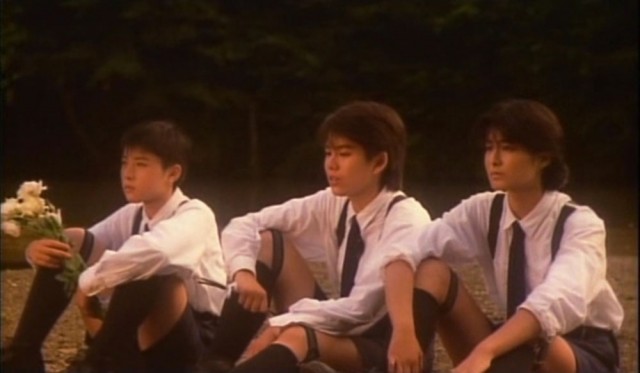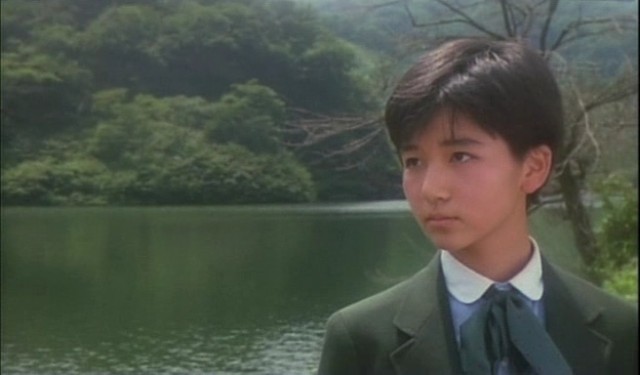GLOBUS FILM SERIES: SUMMER VACATION 1999 (SEN-KYUHYAKU-KYUJU-KYU-NEN NO NATSUYASUMI) (Shusuke Kaneko, 1988)
Japan Society
333 East 47th St. at First Ave.
Thursday, March 13, $12, 7:00
Series runs March 13-29
212-715-1258
www.japansociety.org
 The first part of Japan Society’s tribute to Ohio-born writer, critic, scholar, curator, and filmmaker Donald Richie, who died in February 2013 at the age of eighty-eight, consisted of five classic dramas from Japan’s cinematic elite (Akira Kurosawa, Kenji Mizoguchi, Yasujiro Ozu, Mitsuo Yanagimachi, and Hirokazu Kore-eda). “Richie’s Fantastic Five” is now being followed by “Richie’s Electric Eight: The Bold & the Daring,” comprising eight cutting-edge works by emerging filmmakers. The seventeen-day festival begins March 13 with a rare screening of Shusuke Kaneko’s gender-bending Summer Vacation 1999. Based on Moto Hagio’s shōjo manga The Heart of Thomas, the 1988 film takes place in a boarding school in the near future, as three friends, Kazuhiko (Tomoko Otakara), Naoto (Miyuki Nakano), and Norio (Eri Fukatsu), who are spending the summer alone in their all-boys boarding school, try to recover from the suicide of Yu (Eri Miyajima), who jumped off a cliff after being rejected by Kazuhiko. When a new student, Kaoru (Miyajima), shows up, looking and acting just like Yu, the other boys are forced to face their innermost fears and desires.
The first part of Japan Society’s tribute to Ohio-born writer, critic, scholar, curator, and filmmaker Donald Richie, who died in February 2013 at the age of eighty-eight, consisted of five classic dramas from Japan’s cinematic elite (Akira Kurosawa, Kenji Mizoguchi, Yasujiro Ozu, Mitsuo Yanagimachi, and Hirokazu Kore-eda). “Richie’s Fantastic Five” is now being followed by “Richie’s Electric Eight: The Bold & the Daring,” comprising eight cutting-edge works by emerging filmmakers. The seventeen-day festival begins March 13 with a rare screening of Shusuke Kaneko’s gender-bending Summer Vacation 1999. Based on Moto Hagio’s shōjo manga The Heart of Thomas, the 1988 film takes place in a boarding school in the near future, as three friends, Kazuhiko (Tomoko Otakara), Naoto (Miyuki Nakano), and Norio (Eri Fukatsu), who are spending the summer alone in their all-boys boarding school, try to recover from the suicide of Yu (Eri Miyajima), who jumped off a cliff after being rejected by Kazuhiko. When a new student, Kaoru (Miyajima), shows up, looking and acting just like Yu, the other boys are forced to face their innermost fears and desires.
Beautifully shot in a lush, dreamy 1970s-style palette by Kenji Takama, Summer Vacation 1999 is a prime example of the Japanese yaoi, or boys love, subgenre, focusing on homoeroticism among adolescent boys. Kaneko, who had previously made a pair of Nikkatsu Roman Porno films and would go on to direct monster movies featuring Godzilla, Gamera, and Mothra as well as Death Note and its sequel, explores the students’ growing love and attraction for one another in desexualized yet fetishistic ways, especially in a tender scene in which one boy gives mouth-to-mouth CPR to another, while incorporating elements of the Japanese ghost story as Kaoru continues to evoke Yu. Kaneko also twists the Noh and Kabuki tradition of men performing all the roles, as the four characters are played by females. “One watches these young people, so young that a degree of androgyny is expected, and it is as though one is watching adolescence for the first time,” Richie wrote in his 1988 New Japanese Cinema report for Japan Society. “Given the entire nature of the endeavor, it cannot but help to occasionally teeter on the edge of kitsch (the production looks too French, the music is too Faure, the whole idea also has a flavor of outré) but it never falls in, is never sentimental, and manages to increase its beauty (and our wonder) to the very end.” Plus, the hairstyles are worth the price of admission all by themselves. Summer Vacation will be introduced by MoMA film curator emeritus Laurence Kardish and will be followed by a yaoi party with Ideal Orkestra in which guests are encouraged to dress androgynously. (The Globus Film Series tribute to Richie continues with such other eclectic works as Yoshitaro Nomura’s Chase, Kazuhiro Soda’s Campaign, and Shohei Imamura’s Profound Desire of the Gods.)

